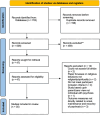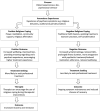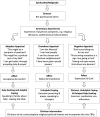The Role of Spirituality and Religiosity in the Maintenance and Recovery of Psychosis: A Systematic Review
- PMID: 40605616
- PMCID: PMC12223707
- DOI: 10.1111/eip.70061
The Role of Spirituality and Religiosity in the Maintenance and Recovery of Psychosis: A Systematic Review
Abstract
Objective: Many individuals with psychosis consider themselves religious or spiritual and report using religion as a means of coping with their illness. However, research exploring the impact of religiosity and spirituality on the experience of psychosis is sparse, with most studies focusing on delusions or hallucinations with religious content.
Methods: A systematic review examined the evidence regarding the role of religiosity/spirituality in the maintenance and recovery of psychosis.
Results: A total of 35 studies were eligible for inclusion. In terms of maintenance, religiosity and spirituality were positively correlated with positive symptoms of psychosis. Individualised religious practice was associated with more severe delusions, while high intrinsic religiosity was associated with an increased severity of auditory and visual hallucinations. In terms of recovery, Positive Religious Coping (PRC) was found to improve wellbeing, quality of life, treatment expectancy, and medication adherence, while Negative Religious Coping (NRC) increased suicidality, positive symptom severity, and illness duration, and reduced social functioning. Holding religious/spiritual explanatory models was correlated with increased psychosis symptom severity and delayed recovery, while holding a bio-psychosocial explanatory model assisted with recovery.
Conclusions: Religiosity/spirituality appears to play a significant role in the maintenance and recovery of positive symptoms of psychosis. CBTp could be enhanced by integrating religiosity and spirituality into assessment, formulation, and the development of targeted interventions. This approach would promote more culturally adapted CBTp and improved engagement with clients from diverse cultural backgrounds in Early Intervention Services.
Keywords: cognitive model; maintenance; psychosis; recovery; religiosity/spirituality.
Early Intervention in Psychiatry© 2025 The Author(s). Early Intervention in Psychiatry published by John Wiley & Sons Australia, Ltd.
Figures



Similar articles
-
Cognitive behavioural therapy (group) for schizophrenia.Cochrane Database Syst Rev. 2022 Jul 12;7(7):CD009608. doi: 10.1002/14651858.CD009608.pub2. Cochrane Database Syst Rev. 2022. PMID: 35866377 Free PMC article.
-
Mental health recovery for people with schizophrenia in Southeast Asia: A systematic review.J Psychiatr Ment Health Nurs. 2023 Aug;30(4):620-636. doi: 10.1111/jpm.12902. Epub 2023 Feb 5. J Psychiatr Ment Health Nurs. 2023. PMID: 36681884
-
Twenty-five years later--what do we know about religion/spirituality and psychological well-being among breast cancer survivors? A systematic review.J Cancer Surviv. 2012 Mar;6(1):82-94. doi: 10.1007/s11764-011-0193-7. Epub 2011 Dec 25. J Cancer Surviv. 2012. PMID: 22198806
-
Influence of religion and spirituality on head and neck cancer patients and their caregivers: a protocol for a scoping review.Syst Rev. 2025 Jan 28;14(1):27. doi: 10.1186/s13643-025-02768-5. Syst Rev. 2025. PMID: 39875944 Free PMC article.
-
Early intervention for psychosis.Cochrane Database Syst Rev. 2006 Oct 18;(4):CD004718. doi: 10.1002/14651858.CD004718.pub2. Cochrane Database Syst Rev. 2006. Update in: Cochrane Database Syst Rev. 2011 Jun 15;(6):CD004718. doi: 10.1002/14651858.CD004718.pub3. PMID: 17054213 Updated.
References
-
- Amadi, K. U. , Aguocha C. M., Attama M. C., et al. 2021. “Religiosity and Treatment Adherence Among Out‐Patients With Schizophrenia.” Mental Health, Religion and Culture 24, no. 5: 493–503. 10.1080/13674676.2020.1826916. - DOI
-
- American Psychiatric Association . 2013. Diagnostic and Statistical Manual of Mental Disorders. Vol. 5. 5th ed. American Psychiatric Association. 10.1176/appi.books.9780890425596. - DOI
Publication types
MeSH terms
LinkOut - more resources
Full Text Sources
Medical

